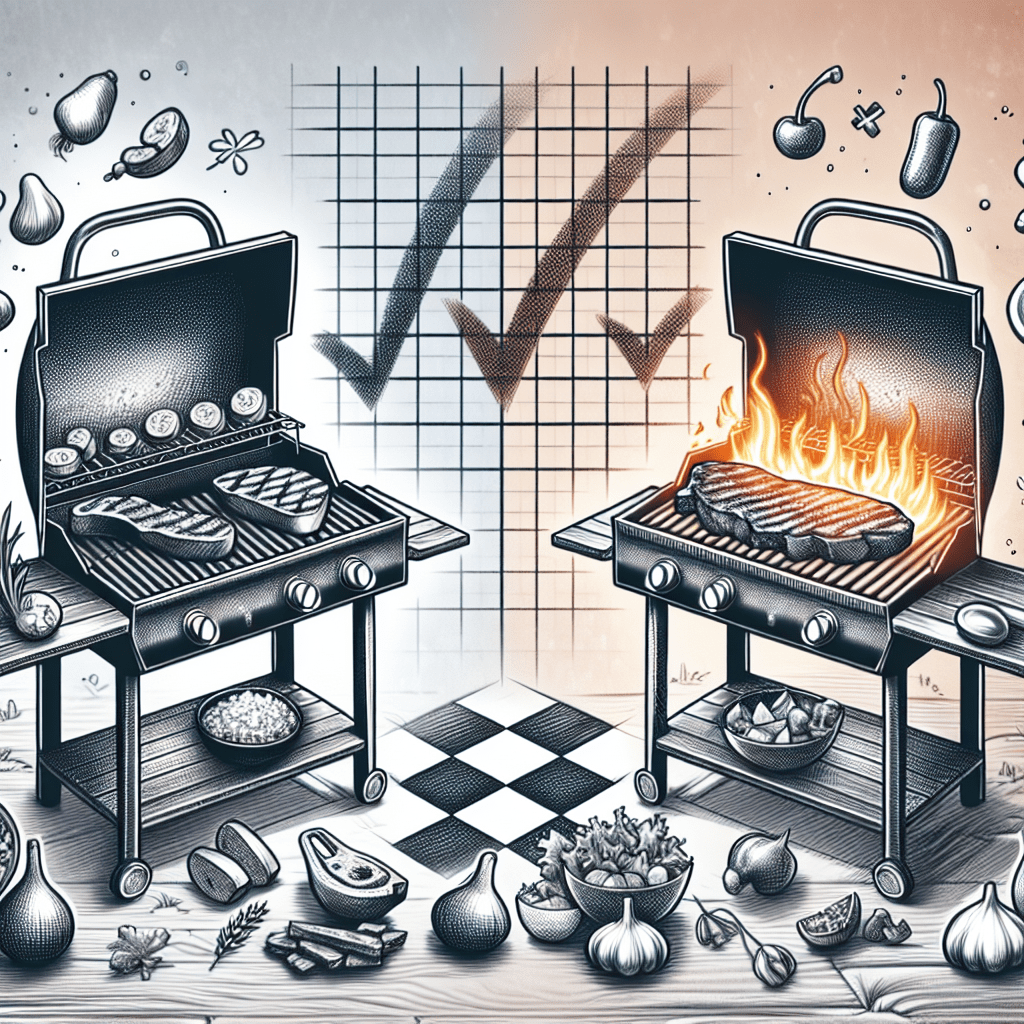[ad_1]
Understanding Charcoal and Gas Grilling
When it comes to outdoor cooking, the debate between charcoal and gas grilling is as old as time. Each method offers its own set of advantages and disadvantages, and choosing the right one can significantly impact the flavor of your food and your overall grilling experience. Whether you’re a seasoned grill master or a novice looking to break in your new patio addition, understanding the nuances of both grilling methods is essential.
Pros and Cons of Charcoal Grilling
Pros:
- Rich, Smoky Flavor: Charcoal grilling is well-known for imparting a distinct smoky flavor that is often associated with classic barbecue.
- High Heat: Charcoal can reach higher temperatures than gas, making it ideal for searing meat.
- Cost-Effective: Generally, charcoal grills are less expensive to purchase than their gas counterparts.
Cons:
- Longer Preheat Time: It takes more time to get a charcoal grill up to the desired temperature.
- Messier Cleanup: Ashes and unburnt charcoal make cleanup more cumbersome.
- Harder to Control Temperature: Adjusting and maintaining the right temperature requires more skill and attention.
Pros and Cons of Gas Grilling
Pros:
- Convenience: Gas grills light instantly and reach cooking temperatures quickly.
- Temperature Control: Easy adjustment knobs offer precise control over cooking temperature.
- Cleaner Operation: Gas burns cleaner than charcoal, resulting in less soot and ash.
Cons:
- Flavor: Food grilled on a gas grill lacks the smoky depth that charcoal grilling offers.
- Cost: Gas grills are typically more expensive upfront and require purchasing propane or natural gas.
- Complexity: With more parts and connections, gas grills require more maintenance and can have a higher chance of malfunction.
Flavor Comparison
The main difference that sways many towards one grill type over the another is the flavor. Charcoal enthusiasts swear by the rich, smoky infusion that only charcoal can provide. This smokiness is due to the dripping of fats and juices onto the hot coals, which then vaporize and permeate the meat with that unmistakable barbecue aroma and taste.
On the other hand, gas grilling offers a cleaner taste profile, which some prefer, especially when cooking more delicate foods like fish and vegetables. While gas grills can still achieve a certain level of smoky flavor, especially with added smoker boxes and flavored wood chips, they cannot naturally replicate the deep smoky essence of charcoal.
Which One to Choose?
Your choice between charcoal and gas grilling will ultimately depend on what you value most in your grilling experience. If flavor is your top priority and you don’t mind the extra prep and cleanup time, charcoal grilling may be the way to go. Conversely, if convenience and control are paramount, a gas grill will serve you well. Consider your cooking style, taste preferences, and how much time you’re willing to invest in grilling to make the most informed decision.
Key Takeaways
- Charcoal grills provide a richer, smokier flavor but require more time and effort for both prepping and cleaning.
- Gas grills offer convenience and precise temperature control, making them suitable for quick and easy grilling.
- The choice between charcoal and gas grilling depends on personal preferences regarding flavor, convenience, and grilling style.
Frequently Asked Questions (FAQs)
Can I get a smoky flavor with a gas grill?
Yes, by using smoker boxes with wood chips, you can add a smoky flavor to your food even on a gas grill.
Is charcoal or gas grilling healthier?
Both can be healthy if used properly. However, charcoal grilling can produce more polycyclic aromatic hydrocarbons and heterocyclic amines due to the smoke created when fat drips onto the coal and ignites. Minimizing direct exposure of food to open flames and using marinades can help reduce these risks.
How much more does a gas grill cost compared to a charcoal grill?
The upfront cost of a gas grill is generally higher than a charcoal grill. However, operational costs can vary depending on local prices for charcoal and propane.
[ad_2]

Leave a Reply